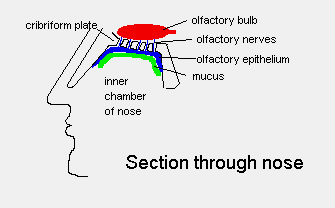..a dog really can smell your fear? When we are in a stressful situation, we tend to sweat. With the sweat, we secrete pheromones, which are special chemicals. Humans cannot consciously detect pheromones, but a lot of the time it is a person's "scent" that makes them attractive to us. This is also what a dog can smell.
 |
There was also a time when women gave men
something called a 'love apple'. She would peel an apple and place it in
her armpit, saturating the apple with her sweat. The aim was so that a man
would be able to smell her pheromones in the apple, and remember her or
become attracted to her.
|
The main functions of the nose are the sense of smell, and the warming, filtration and humidification of the air we breathe. Air is filtrated by the little hairs in the nostrils, and warmed and humidified by the mucous lining of the nose and nasal cavity.
The nose is the prominent portion of the face above the mouth. The cavity of the nose extends from the nostrils to the openings at the back of the nose. The ducts for the drainage of tears from the eyes (nasolacrimal ducts) open into the lower part of each nasal cavity, which is why when we cry, we need to blow the nose.
When we breathe deeply through our nose, the air that passes through the nasal cavity carries a number of odours. Some of these we can consciously detect, such as food or perfume, others we cannot, such as the afore mentioned pheromones.
Olfactory nerves: The receptors for smell are specialised neurons that lie in the tissue lining the upper part of the nasal cavity. These are the olfactory nerves, the receptor cells responsible for smell. During light breathing, air does not pass through the upper part of the nasal cavity where the olfactory receptors are situated. Sniffing draws air into the olfactory region and enhances the sense of smell. From here the impulse is carried to the brain, and an odour is detected.
Unlike taste, the sense of smell adapts rapidly, so that after a few minutes' exposure to a particular odour we can no longer smell it.